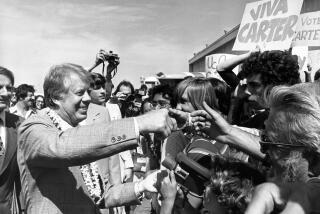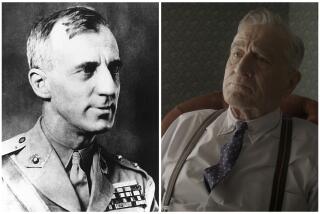MOVIE REVIEWS : ‘True Colors’ Paints Picture of Greed, Political Corruption
- Share via
The ‘60s may be making a comeback on the movie screens, but don’t count out the ‘80s. The Greed Is Good Decade is custom-made for an industry where greed has always been good. There’s nothing quite so hypocritical as a Hollywood movie about hypocrisy.
The people who made “True Colors”--principally director Herbert Ross and screenwriter Kevin Wade--are at least aware of the double standard. They recognize that the smarmy politicking in this film is its juicy center.
It’s a movie about two University of Virginia law students whose friendship comes apart as their lives intersect on Washington’s fast track. Tim Garrity (James Spader) is a golden-boy preppie who dates the daughter (Imogen Stubbs) of a liberal senator (Richard Widmark) and goes on to work for the Department of Justice. He’s the principled one.
Peter Burton (John Cusack), Tim’s roommate, drops out of law school to work as the senator’s aide. His aim: To replace the senator within 10 years. Along the way, he manages to swipe the daughter, cut a crooked campaign-finance deal with a real-estate shark (Mandy Patinkin) and alienate just about everybody.
Movies about political corruption generally bog down in moralistic quicksands. Few American films have the courage to take their cynicism to the limit, and “True Colors” (at the Mann Plaza) is no exception.
This Capra-corny reliance on the ultimate sagacity of The People doesn’t jibe with the film’s fine edge of avarice. Tim is righteousness incarnate, and Spader can’t seem to pull a performance out of all that goodness. He is uncomfortably upstanding in the role. He looks as though he would rather swap roles with Cusack.
No wonder. Cusack’s Peter is a classic scrounger--he’s practically an American archetype. At first, Cusack’s performance may seem too close to his work in “The Grifters,” but it has a completely different engine. In “The Grifters,” Cusack was playing a small-time con artist with a low-rent hustle; in “True Colors” (rated R for strong language and brief sex) he is energized for the main chance.
Even though Cusack is developing into an extraordinary actor, he has to overcome the fact that he is slightly miscast in the role. He doesn’t have the heft or the camera-friendly features that favor media-age politicians; except at the very end, we don’t see Peter in the process of spellbinding his audiences, and so we’re forced to accept his rapid rise as a given.
And his rise isn’t keyed into any political agenda. (This doesn’t seem satirical, just negligent.) Peter is a vaguely liberal populist but his politics are just hazy enough to give his campaign a generic quality. That’s one of the ways in which the filmmakers succeed in making a political film without any political content--a real ‘80s hat-trick.
It’s a tribute to Cusack’s energy that he makes Peter a spellbinder anyway. He has thought out his performance so completely, even in his silent moments, that you can read the shifts in his darting eyes as clearly as if he were speaking lines straight into the camera. Cusack gives Peter a dark, desperate, conscience-less edge, and yet you can see how he might appeal to men and women of conscience. You can also see how he rides right over the people who see through him, like the senator’s chief aide (Paul Guilfoyle, in a sharp performance.)
Sometimes a movie exists primarily to showcase a wonderful performance. “True Colors” should be seen for Cusack.
More to Read
Only good movies
Get the Indie Focus newsletter, Mark Olsen's weekly guide to the world of cinema.
You may occasionally receive promotional content from the Los Angeles Times.










